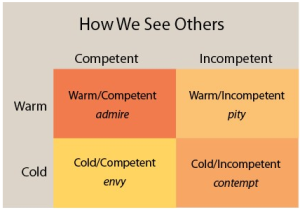Warmth and competence. That is what social psychologist Amy Cuddy says we use in our automatic judgments of others and allows us to group people into one of four categories:
 Cuddy also discusses nonverbal cues and indicates that we feel very weary of others when their verbal and nonverbal cues aren't synchronized.
Cuddy delivers a very interesting TED talk in which she says that just a couple minutes of a "power pose" can raise our testosterone and lower our cortisol levels. These open and expansive postures indicate dominance and competence and lower our stress levels. There is a back and forth interaction where our perceived dominance affects our hormones but our hormones also affect our perceived dominance. If an alpha is somehow removed, within days the next highest alpha will undergo these hormonal changes.
She finishes with the following advice, "...it’s rarely a good idea to strive to show everyone that you’re the smartest guy in the room: that person tends to be less creative, and less cognitively open to other ideas and people...the goal should be connecting. When people give a speech or lead a meeting...they tend to exaggerate the importance of words. They care too much about content and delivering it with precision. That makes them sound scripted. It is much better to come into a room, be trusting, connect with the audience wherever they are, and then move them with you.”
This article is well worth the read if you're at all interested in how to become more confident, how to better utilize verbal and nonverbal cues to indicate competence and warmth, understand how and why others instinctively judge you and how to avoid incorrectly grouping and stereotyping people.
Cuddy also discusses nonverbal cues and indicates that we feel very weary of others when their verbal and nonverbal cues aren't synchronized.
Cuddy delivers a very interesting TED talk in which she says that just a couple minutes of a "power pose" can raise our testosterone and lower our cortisol levels. These open and expansive postures indicate dominance and competence and lower our stress levels. There is a back and forth interaction where our perceived dominance affects our hormones but our hormones also affect our perceived dominance. If an alpha is somehow removed, within days the next highest alpha will undergo these hormonal changes.
She finishes with the following advice, "...it’s rarely a good idea to strive to show everyone that you’re the smartest guy in the room: that person tends to be less creative, and less cognitively open to other ideas and people...the goal should be connecting. When people give a speech or lead a meeting...they tend to exaggerate the importance of words. They care too much about content and delivering it with precision. That makes them sound scripted. It is much better to come into a room, be trusting, connect with the audience wherever they are, and then move them with you.”
This article is well worth the read if you're at all interested in how to become more confident, how to better utilize verbal and nonverbal cues to indicate competence and warmth, understand how and why others instinctively judge you and how to avoid incorrectly grouping and stereotyping people.
